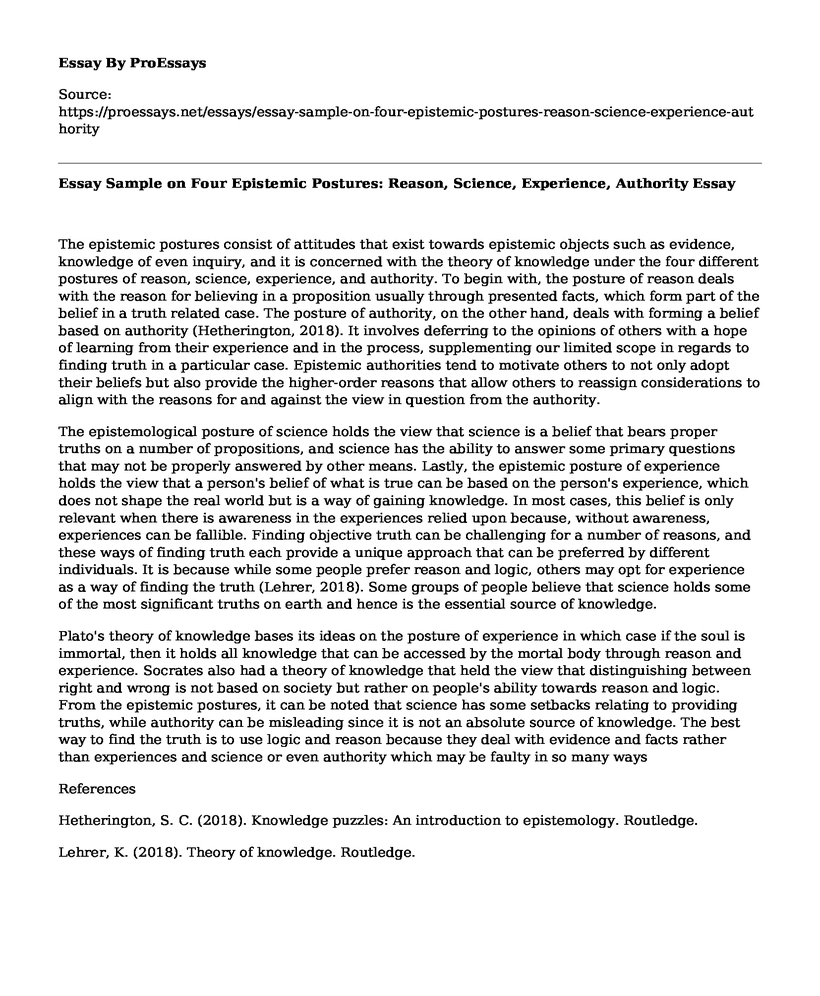The epistemic postures consist of attitudes that exist towards epistemic objects such as evidence, knowledge of even inquiry, and it is concerned with the theory of knowledge under the four different postures of reason, science, experience, and authority. To begin with, the posture of reason deals with the reason for believing in a proposition usually through presented facts, which form part of the belief in a truth related case. The posture of authority, on the other hand, deals with forming a belief based on authority (Hetherington, 2018). It involves deferring to the opinions of others with a hope of learning from their experience and in the process, supplementing our limited scope in regards to finding truth in a particular case. Epistemic authorities tend to motivate others to not only adopt their beliefs but also provide the higher-order reasons that allow others to reassign considerations to align with the reasons for and against the view in question from the authority.
The epistemological posture of science holds the view that science is a belief that bears proper truths on a number of propositions, and science has the ability to answer some primary questions that may not be properly answered by other means. Lastly, the epistemic posture of experience holds the view that a person's belief of what is true can be based on the person's experience, which does not shape the real world but is a way of gaining knowledge. In most cases, this belief is only relevant when there is awareness in the experiences relied upon because, without awareness, experiences can be fallible. Finding objective truth can be challenging for a number of reasons, and these ways of finding truth each provide a unique approach that can be preferred by different individuals. It is because while some people prefer reason and logic, others may opt for experience as a way of finding the truth (Lehrer, 2018). Some groups of people believe that science holds some of the most significant truths on earth and hence is the essential source of knowledge.
Plato's theory of knowledge bases its ideas on the posture of experience in which case if the soul is immortal, then it holds all knowledge that can be accessed by the mortal body through reason and experience. Socrates also had a theory of knowledge that held the view that distinguishing between right and wrong is not based on society but rather on people's ability towards reason and logic. From the epistemic postures, it can be noted that science has some setbacks relating to providing truths, while authority can be misleading since it is not an absolute source of knowledge. The best way to find the truth is to use logic and reason because they deal with evidence and facts rather than experiences and science or even authority which may be faulty in so many ways
References
Hetherington, S. C. (2018). Knowledge puzzles: An introduction to epistemology. Routledge.
Lehrer, K. (2018). Theory of knowledge. Routledge.
Cite this page
Essay Sample on Four Epistemic Postures: Reason, Science, Experience, Authority. (2023, Mar 16). Retrieved from https://proessays.net/essays/essay-sample-on-four-epistemic-postures-reason-science-experience-authority
If you are the original author of this essay and no longer wish to have it published on the ProEssays website, please click below to request its removal:
- Paper Example on Aristotle's Virtue Ethics
- Self-Identity Questions Paper Example
- Essay on Nature as a Guide for Morality and Solution to Humankind's Problems
- Moral Values: Essential for Society's Professionalism and Unity - Essay Sample
- Ultimate Questions of Life
- Essay Example on Unethical Experiments: Death & Suffering from Tuskegee & Milgram's Studies
- Book Analysis Essay on Socrates' Apology







